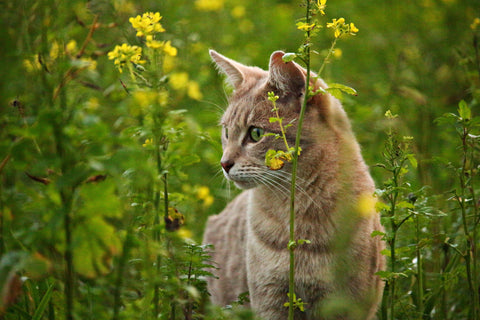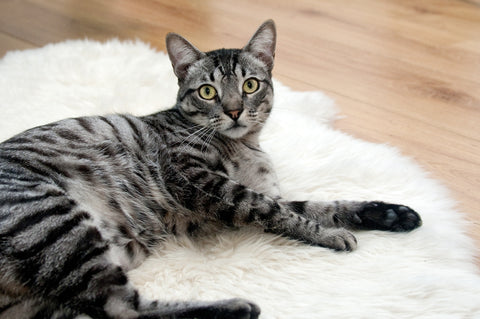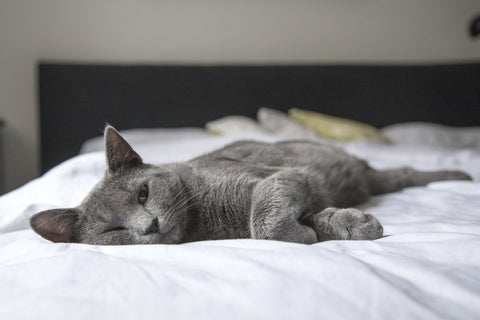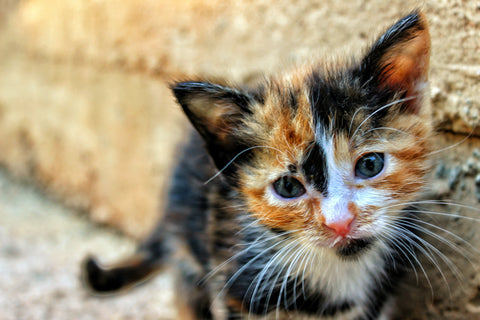
Is your cat itchy? Signs, causes and treatment explored
Is your cat itchy? Signs, causes and solutions explored
Even the most fastidious feline can become a little itchy from time to time. But why do cats get itchy, can how can we soothe irritating itches and ease the urge to scratch?
Our pets can’t really speak up when something’s not quite right. So how can you tell if your cat has dry, niggly, itchy skin? There are lots of signs to keep an eye out for...

How to tell if your cat has itchy skin
There are six tell-tale symptoms that your cat’s itchiness is something that needs addressing. Keep a look out for:
- Scratching that’s more than occasional – a few scratches a day is normal, every few minutes is cause for attention.
- Over-grooming or your cat pulling out its coat.
- Chewing and nibbling at their skin and coat.
- Thinner or balding patches in their coat.
- Coughing up lots of hairballs.
- Dry or flaking skin.
What are the causes of itchy cat skin?
There are lots of reasons your cat might be feeling a bit itchy, but we’ll start with the most common ones, then explore how you can help your cat feel more comfortable in their skin.
1. Pesky pests
Itchy invaders like fleas, ticks and mites tend to be the most common reason for itchy skin in cats. Modern, centrally-heated homes mean that fleas can be a problem all year round, even when it’s not ‘flea season’. Symptoms to look out for include:
- Pesky fleas themselves – small black specks (about the size of pin-head) that jump and move erratically.
- Flea dirt – what looks like black grit in the fur. Put a bit on some on damp kitchen roll, if it leaves a rusty mark, your cat has fleas.
- Flea bites on human family members – especially around ankles!
- Harvest mites – these look like red ‘dust’, and are usually found in areas with less fur.
- Ticks – larger than a flea, they grow as they feed. They can feel like a little wart or lump and are more common on cats who are free to roam.
Cat’s Protection League produces a great guide to all the different pests cats can pick up – read it here, and scroll on for advice.
How to stop cats itching due to pests:
When it comes to pesky pets like fleas, prevention is always better than cure. It’s a good idea to use a high-quality spot-on treatment every 4-6 weeks, all year round.
Even if you can’t see fleas, an infestation can happen quickly, so take steps to keep these itchy biters away. If it’s too late, and fleas have already taken hold, you can read our guide to getting rid of fleas here.

2. Dietary factors
Some cat foods don’t contain everything every cat needs to stay in tip-top form. Some cats have dietary allergies (meaning they can’t eat certain foods) whilst all need plenty of ‘good fats’ to keep their skin supple, healthy and moisturised. It’s tricky to spot if diet may be making them itchy, but some pointers include:
- A recent change to their food – for example if you’ve changed their brand.
- The manufacturer has changed the changed the food formula – an internet search will help you discover this.
- You’re feeding a value food – some of these contain bulking ingredients that aren’t well tolerated by all cats.
A food allergy – your vet will be able to give you advice on testing for this.
How to stop cats itching due to diet:
Talk to your vet about hypoallergenic foods or do your research online. Then gradually change your cat’s diet and see if it’s sayonara scratching!
Don’t forget that treats can cause reactions too, so whilst you’re working out what might be the cause of the itch, don’t feed treats that aren’t 100% natural (dried fish skins are a purrfect choice!)
3. Environmental factors
This covers environmental irritants and things like central heating. We tend to keep our homes very warm and dry, which can dry out human and feline skin. It’s easy for us to slather on some moisturiser but not so easy for our furry friends. Cats can also be sensitive to chemicals; from washing powder and cleaning products to the anti-cat spray your neighbours might be using around their garden!
Here are some signs that may mean environmental factors are the cause:
- There are no pests and you haven’t changed their diet.
- Your cat is inconsistently itchy – they suddenly scratch more after coming in from the garden for example.
- You’ve recently changed something around the house – new scented candles, washing powder or cleaning products.
- It’s winter-time, and the heating is on high a lot.
You’ve moved your cat’s bed somewhere very warm and dry to keep them snug as the weather is chilly.

How to stop cats itching due to their environment:
If you think your cat is itching due to environmental factors, the first treatment is to enrich its environment. This can help cats who groom because they’re stressed or bored. There are lots of reasons cats can be stressed including changes to routine, having to share resources with other cats, or being lonely if they are left alone for much of the day. Work on the causes where possible, and in the meantime give them a happier home by:
- Creating more opportunities to climb and hide – especially if yours is multi-cat household.
- Create separate feeding spots if you have more than one cat.
- Invest in some fun toys to keep your kitty entertained if you work long hours – food puzzles are great.
- Get crafty and make a DIY cat tree – or get a modular kit and go all-out for a cat castle!
- Make sure they have a place to scratch – it’s natural and healthy for them to do so.
- Treat them to some cat DVDs, or if you want a real treat for your kitty and yourself, invest in an aquarium. Many cats will be transfixed by the movement of the fish!
- Make time for play – cats may be independent, but most really value interaction, so make time for some fun and games every day.
4. Psychological factors
Everyone knows that cats are clean creatures who like to groom themselves. But did you know that they also like to groom as a calming mechanism? The action of ‘washing’ feels really soothing to them. However, too much grooming can lead to itchy skin and patches of fur loss and this can be a sign that your cat isn’t very happy. They also sometimes groom because they’re bored.
Here’s how to tell if psychological factors are causing your cat’s itching:
- Does your cat now spend more (or less) time alone?
- Have you welcomed a new human or furry family member that’s upset the balance?
- Has something changed recently – is your routine different?
- Have your neighbours recently got a new pet? A new cat on the patch can really upset the delicate territorial balance, especially if you live in a built-up area, and dogs can cause stress as cats adjust to the change.
- Time of year – many cats find changes to their routine upsetting, so may get stressed if you have lots of visitors over Christmas, or if there are lots of scary bangs at fireworks time.
Are they an indoor-only cat in a smaller home? Do they have enough to do to keep themselves entertained if you leave them home alone?
How to stop cats itching due to psychological factors:
Have a think - what have you changed recently? It may be that your cat is feeling itchy because you’ve opted for a fragranced washing powder, changed your bathroom or floor cleaner, or spritzed the sofa with an odour destroying spray.
If you have made a change recently, revert to your old product routine if you can, and with a little luck, your kitty will be thanking you with lots of purrs and less scratching. It can also be helpful to support the skin barrier with a supplement like YuDERM Cat too.
5. Medical factors
There are many medical reasons your cat might have itchy skin. This can range from simple infectious things like ringworm that can be easily treated to more complex causes. It can also include trauma if your cat gets in a fight with another feline, through to sun damage and inconsistencies with the way your cat’s skin forms. Lots of washing can even be a sign that your cat is in pain, so if the itching doesn’t seem to be covered by pest, environmental, psychological or dietary factors, it’s best to talk to your vet.
If your cat is itchy and you can’t work out why, it can be an early sign that something more serious isn’t right. A trip to the vets will help to pinpoint what’s happening, and help your feline friend feel on top form again.

What else can you do to ensure your cat’s skin is in good condition?
Even if your cat is getting some of this nutrition in their diet, providing a supplement with a specially balanced combination of the right natural oils helps to support their skin and coat condition from within.
A great way to further soothe itchy skin caused by allergies and environmental factors is to build up the skin’s natural barrier with a supplement like YuDERM Cat.
Dry skin affects cats in a similar way to people – if the moisture barrier isn’t well looked after and regularly topped up, it can lead to dry skin, itchiness and flaking. Your cat can’t rub in some soothing body lotion, but you can add moisture from the inside out. By providing Omega 6 oil and Linoleic acid you can help maintain your cat’s skin natural moisture barrier from within.
We hope you’ve found our top tips for itchy cat skin useful, and it’s helped you to understand why your cat is itchy and how to help. We’d love to meet your cat on Facebook, Instagram and Twitter – so if you’ve got some kitty pics and videos to share, you’ll make our day!







